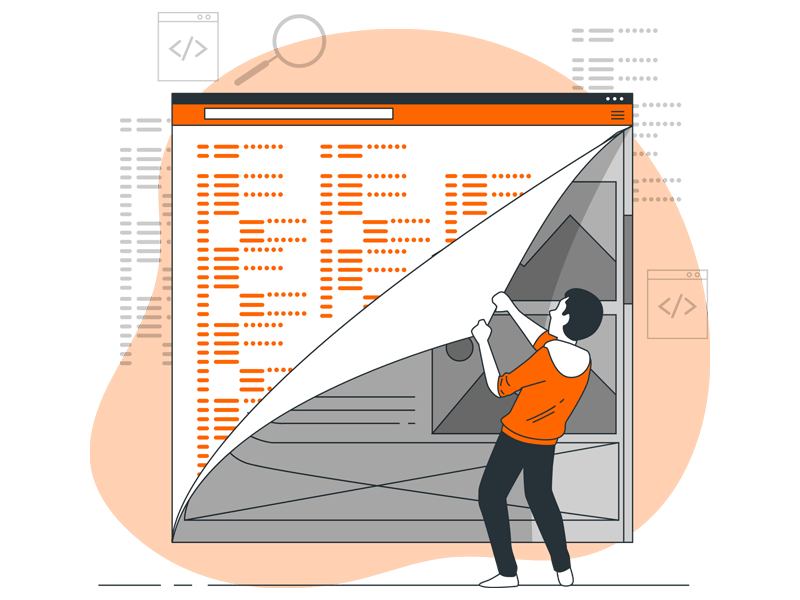Introduction to Front-end Development
In today’s technology-driven world, front-end development has become an integral part of businesses, and front-end developers play a vital role in creating appealing user interfaces for websites and applications.
Definition of front-end development
Front-end development involves the creation of visual components that users experience on their devices when interacting with websites or applications. This includes everything from layouts, typography, graphics, and style, CSS programming, and behavioral interactions using JavaScript plugins.
Explanation of why it’s an important career in tech
According to recent statistics, there is a growing demand for software developers around the world, and this profession offer very competitive salaries. In particular, front-end developers are highly sought-after because they connect business ideas with consumers through beautiful UI design and seamless user experience.
As businesses evolves towards online solutions, integration of advanced technology functionality including use feeds, machine learning, and AI; along with several other layers of intelligent data analytics means that more opportunities will continue emerging in the field.
Therefore, given the relatively high global-demand and good pay packages associated with front-end development jobs, it provides a perfect opportunity for young technologies enthusiasts to start a promising new career path in the digital space.
Brief overview of skills required
To excel in a career as a front-end developer, one must hone his/her abilities in web designing tools such as HTML, CSS and JavaScript whilst keeping abreast of modern web-design practices on various Web Development platforms such as WordPress and Squarespace . It is also essential to have an artistic mind that thinks beyond simple website building by interpreting real-world problems into interactive solutions.
Skills Required
Becoming a successful front-end developer is not just about having a passion for code, it also requires mastering several key skills sets to create and maintain great web applications. In this section, we will dive into the necessary skills you need to have.
Proficiency in HTML, CSS, and JavaScript
Front-end developers are responsible for creating visually appealing, engaging and interactive websites that leads to user satisfaction. As such, proficiency in front-end languages such as HTML, CSS, and JavaScript is crucial. HTML serves as the foundation of every web application and provides the structure of your website elements. CSS complements HTML, providing styling for these elements by incorporating colors, fonts and layout designs. Finally, JavaScript adds interactivity to the page (think pop-ups, animations etc.) To be an effective front-end developer, you’ll want to master these three coding languages along with current industry standard best practices.
Knowledge of front-end frameworks such as React, Angular, and Vue.js
Having experience with popular front-end frameworks like React, Angular or Vue.js can give you a competitive edge when it comes to landing jobs. These frameworks used widely in the development industry helps simplify creating complex web apps or managing intense data loads, making developers’ jobs more efficient. Knowing how to work with these technologies opens up new opportunities and choice projects . Some estimates suggest that by 2023, there will be over 7 million job openings in technology-oriented fields which include positions associated with front-end development utilizing these frameworks.
Familiarity with design principles and user experience
Learning basic design concepts and user experience (UX) principles from their correct color schemes to what makes users behave certain ways on the web is another component needed for being a successful front-end developer. UX refers to the overall feel of the interaction between the user and the application’s interface, while UI (user interface) deals with surface-level interactions such as aesthetics and navigational components. Understanding both components empowers frontend developers to produce intuitive experiences designed to meet end-user needs.
Understanding of web development tools and technologies (e.g. Git, NPM)
Today’s thriving tech sphere relies significantly on some essential web development tools and technologies like Git, NPM/yarn; understanding them enhances productivity, teamwork and facilitates collaborative efforts across multiple projects. Git simplifies version control management by allowing software teams to monitor and track source codes changes all in one place. npm package manager aids in managing server-side libraries dependency ensuring smooth integration flows with open-source packages helping avoid duplicated efforts on project-specific functionalities. Mastery of developmental strategies related to workflows related to these platforms has been instrumental in achieving customer requirements at scale.
Responsibilities
Are you up for the job? Becoming a front-end developer entails a myriad of responsibilities that require exceptional skills, precision and keen attention to detail. Here are some of the key aspects that you’ll need to master:
Design Translation: From Mockups to Web Pages
Front-end developers have the task of converting design mockups into functional web pages. This involves bringing static designs to life using HTML, CSS and JavaScript frameworks such as React or AngularJS. The ultimate goal is to create interactive website layouts that deliver seamless user experience.
According to Statista.com, 53% of global internet traffic in 2020 was attributed to mobile devices. Therefore, front end developers must ensure that websites are optimized across multiple screens, including desktops, tablets, and smartphones.
Accessibility and Responsiveness
Accessibility is another key responsibility for front-end developers. Data from the World Health Organization (WHO) indicates that an estimated 2.2 billion people globally suffer from vision impairment or blindness. As such, creating accessible websites ensures equal access to information for all users.
In addition to accessibility, developers must also ensure that their websites are responsive. With different screen sizes, it’s essential to implement responsive design techniques that maintain optimal layout, readability, and ease-of-use.
Collaboration with Back-End Developers and Designers
Front-end developers often work alongside designers, collaborating on visual elements like typography and color scheme while ensuring brand consistency. They also collaborate with back-end developers who develop server-side logic (using programming languages such as Java, Python or Ruby), API integrations and database management.
Collaboration drives creativity and fuels innovation; hence clear communication channels must be established between the teams involved in order to achieve project goals efficiently.
Clean Code Writing
Clean code structures not only make development easier but also enhance website performance. Front-end developers should strive to write clean and concise codes that adhere to best practices and take care of scalability.
A survey conducted by Stack Overflow indicated that over 77% of professional developers worldwide regularly debug their own code before publishing it live. Testing enhances functionality, improves overall quality control and increases compatibility across various platforms.
Testing and Debugging Websites
Debugging web pages requires a problem-solving approach that allows error identification through testing processes. Website bugs can impact page speed, search engine optimization ranking (SEO) and put functionality at stake if not addressed promptly.
Therefore, conducting tests with test-driven development tools reduces downtime while keeping the website running smoothly by enhancing monitoring capabilities.
The ability to consistently deliver excellent results relies heavily on mastering these five key areas of responsibilities as a front-end developer – translating design mockups to functioning web pages, ensuring webpages are responsive and accessible, collaborating with designers and back-end developers, writing clean and maintainable code: **carving out any debugging errors** when encountered during testing sessions. Thus, stay curious about emerging trends in front-end development to keep your technical expertise sharp!
Salaries
In today’s world, tech-related jobs hold a lot of promise for those who want to pursue them – in terms of job security and financial stability. But how much does a front-end developer really make? Is it enough to get you by, or can you actually lead quite an amazing lifestyle with what a front-end dev makes?
Average Salaries for Front-End Developers
Flashing back to just a few years ago, when “front-end development” as a career path was still relatively new, it wasn’t uncommon to hear somebody say, “But do they really make any money?” The perception then seemed to be that software developers were at the top of the earning ladder while the rest of us fought our way upward rung-by-rung.
However, now we know better! According to Glassdoor – one of the most popular career-focused websites on the internet – the national average salary for a front-end developer is $76,929 per year. Even entry-level salaries are starting out around nearly $60K annually. This is more than many other career choices in both tech and non-tech sectors prove to offer beginners.
There is no shortage of opportunities within this profession, nor does it look like demand for skilled front-end individuals in the workforce will taper off anytime soon. It’s hard not to see why the position has become so trendy!
Factors That Can Impact Salary
As mentioned above, experience level definitely comes into play regarding what kind of paycheck a talented coder can expect to receive. Working successfully within the field for over two years seems to be the median time where people start seeing larger salaries come their way.
Furthermore, your location matters too. Some may not realize that living in large metropolitan cities means different costs of living might impact earnings negatively depending on where one calls home. For example, if you’re working in San Francisco, New York City, Boston, or even Miami, the cost of buying food or paying rent/housing utilities burn through cash faster than other areas due to higher averages (around double in some cases) than smaller rural towns.
Company size is another factor at stake; naturally, larger firms generally offer greater compensation packages including health insurance benefits and various routine bonuses. Smaller enterprises can only provide so many perks to keep budgets attainable for staff members.
How to Start a Career in Front-end Development
Getting started in a front-end developer career can seem daunting, but with the right steps and approach, it’s manageable.
Education and Training Options: Why Bootcamps Are Your Best Bet!
For aspiring developers, one challenge is finding a reliable path that provides them with technical skills relevant to their job prospects. This challenge is why bootcamps are becoming increasingly popular as an alternative to traditional degree programs. Research data suggests that approximately 79% of graduates from coding bootcamps land employment within six months after graduating, earning an average starting salary of $66,964.
Bootcamps are intensive, tuition-based programs built around real-world tech projects’ execution, including mentor support and professional network establishment. Scheduling options range from full-time courses that run on-site for several weeks or part-time classes held online or in-person over several evenings/weekends. The beauty of these modes of learning is that they teach you practical development concepts used at leading companies without taking years pursuing degrees.
Building a Portfolio of Projects to Showcase Skills – Make Yourself Stand Out with Unique (but Practical) Displays
One way to deepen already acquired knowledge is by building custom-made applications driven by dev interests alongside specific business outcomes. In addition to testing your diverse programming languages skillset- whether HTML/CSS, JavaScript, ReactJS frameworks- showcasing what you build most authentically highlights your talent portfolio. When recruiters screen potential hires nowadays, beyond having requisite hard skills stated in resumes, candidates who display creatively designed solutions come off as high-performing problem-solvers to future employers.
A successful portfolio must be a balance of unique-but-useful applications and features tightly integrated together into stunning designs, fully responsive across devices types. Focus more on discussing how various underlying functions work towards enhancing user experiences than simply stating superficial generalities about the application. There are specialized services such as Github and Codepen which are great platforms for creating a showcase material database.
Networking with other Developers and Attending Meetups or Conferences: Kick-start Your Entry into Relevant Communities
Networking among industry professionals goes primordial when seeking opportunities in competitive niches like web development. Where synergies between devs can facilitate adequate referrals. Networking often leads to establishing valuable connections with people who may give tips and critique code objectively. With networking events available either physically or via social media channels most times actively running throughout the year globally-a dip into these ripe communities offers chances to build friends’ lists significantly.
Meeting attendance schedules might not always align with work/family commitments; Nonetheless, prioritizing attendance encourages interactions vital for relationships’ growth while sharpening vital team-building/networking soft-skills on the journey towards better career moves.
Finding Job Opportunities through Job Boards: Zero-In on Agencies Hiring Top Talent Today
Applying to agencies/hiring firms providing ideal candidate job backgrounds bring individuals genuinely passionate about web development plus design closer to respective sections where hiring managers seek out qualified candidates – think LinkedIn premium and numerous listing organizations recruiting developers now. You can maximize job boards targeting categories aligned with your interest/job aspirations inside every segment tailored towards technology-related fields. Successful job search engagement involves sifting through numerous openings diligently applying to select posts involving potential personal developments curtailed towards interest/skill sets’ satisfaction.
Future of Front-End Development
The future of work and the job market is constantly evolving, especially in the technology industry. As a front-end developer, it’s essential to keep up with existing and emerging technologies and trends that are shaping the industry. In this section, we’ll explore some of these trends and discuss how they will impact the future of front-end development.
Emerging Technologies and Trends in Front-End Development
There has been an explosion of new technologies, tools, and frameworks reshaping front-end development in recent years. From Artificial Intelligence (AI) to Virtual Reality (VR), front-end developers must be adept at leveraging different technologies to deliver unique user experiences. One such trend is Progressive Web Apps (PWA). PWAs use web capabilities to create an app-like experience while providing superior performance in terms of speed, responsiveness, and ease of installation. The number of companies building PWAs has doubled year on year, and research shows that installing PWAs increases retention rates by 50% and conversion rates by 60%.
Another trend transforming front-end development is Voice User Interface (VUI) design. VUI involves using technology like Alexa or Siri, to interact with websites and mobile apps verbally instead of typing. With the popularity of smart speakers surging globally, there is a growing demand for developers who can build voice-driven interfaces. Currently, Amazon has sold more than 100 million Alexa-powered devices worldwide; this creates exciting opportunities for companies looking to innovate in this space.
Opportunities for Career Growth and Advancement
Front-end development is one of the highly sought-after technical roles in the tech space since every organisation needs top-class user experience. Thus understanding the emerging trends gives you an edge over other candidates when applying for similar positions. Companies now recognise that users expect websites and digital products to have more features and better functionality than ever before. They seek experts who understand front-end technology in-depth, apply best practices in developing engaging platforms and providing interactivity across multiple channels.
With increased demand comes career advancement opportunities for front-end developers. Many organisations offer training programs aimed at helping current employees upscale their skillset from simple HTML/CSS/JavaScript Developers to world-class Full-stack engineers.
Learning a variety of programming languages is also expected as part of growth and career advancement prospects. This way, a full-stack developer can take up software engineering roles requiring them to develop powerful backend systems or innovative database management techniques alongside excellent frontend presentations.
In conclusion, remaining relevant and up-to-date with skills sought after by employers requires being conversant with existing developments within your field. Working professional seeking transition into the tech industry or switching career paths should stay abreast of industry trending topics liked Progressive Web Applications, Voice Powered Interfaces amongst others. As new technologies continue to shape Frontend development through improved efficiency and automation resulting in increased demand for sector skilled interpreters welcome to join the front lines of technological innovation.
Conclusion
Recap of key points
As we come to the end of this guide on becoming a front-end developer, let’s take a moment to recap the main points covered thus far. We have seen that front-end development is an integral part of any tech project and requires skills such as proficiency in HTML/CSS/JavaScript, a design eye, and knowledge of various libraries and frameworks.
We have also highlighted some practical steps towards breaking into the field, including building a portfolio, networking with industry professionals, enrolling in coding bootcamps or online courses, and contributing to open-source projects.
Furthermore, we discussed top-paying job opportunities available for front-end developers across multiple industries like healthcare, finance, automotive, and many more.
So if you are looking for a dynamic career that offers endless opportunities for learning and advancement, front-end development could be your calling.
Encouragement to pursue a career in front-end development
To wrap up this guide, we want to encourage you to take the leap and pursue a career in front-end development. With the technology industry showing no signs of slowing down anytime soon, there will always be demand for skilled front-end developers.
According to statistics by Glassdoor (2021), the average annual salary for a front-end developer in the United States stands at $76,929 with potential earnings over $100k annually. In addition, being proficient in front-end development opens doors to diversify into back-end development, full-stack development, user experience (UX) engineering, and much more.
Therefore, we urge you to consider pursuing your dreams and embarking on a journey toward creating engaging digital interfaces through Front-End Development!








